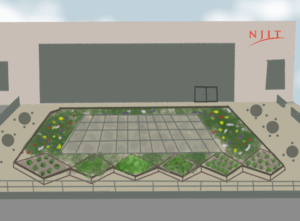
The third floor terrace of NJIT’s Campus Center will soon be revitalized with new garden space. (Photo by Arwa Ouali)
This story was produced in collaboration with CivicStory as part of the NJ Ecology-Civics Reporting Project.
The NJIT Campus Center is one of the most vibrant places on campus. Just about every space is teeming with activity – except for the third-floor terrace.
Quite simply, it’s a forgotten space. Despite the presence of a few tables and chairs, few students hang out there. In fact, the most prominent feature of the terrace is a raised garden bed sitting in the center that houses 20-year-old solar panels. But with the exception of a few perennials that were planted a few years back, there’s no garden to speak of – there’s just a lot of dirt and open patches.
Now, thanks to a $5,000 Love Your Block Grant from the City of Newark, a community garden will soon find its home here, making it one of many urban gardens in Newark. The project is on track to launch this fall.
“I’m genuinely passionate about gardening,’’ remarked Abhijeet Banik, a first-year Engineering student who has been keeping up with the news about the garden since organizers began talking about it last spring.
Originally from Bangladesh, Banik says he has fond memories of growing up with a large outdoor garden filled with seasonal fruit trees and flowering plants. Now that he’s in college, he keeps plants in his room because they give him a sense of calm.
“Being able to grow familiar plants here will give me a sense of home and a chance to share a part of my heritage with the community,’’ he said.

A design of the planned revitalization of the rooftop terrace .
(courtesy of Allie He)
The project is being spearheaded by Dr. Prabhakar Shrestha, Associate Director of the Office of Sustainability, and Ester Flaim, Associate Director of Graduate Studies, who are working with six NJIT staff members who are also Newark residents.
In total, Shrestha envisions up to ten garden plots along the perimeter of the terrace’s raised bed. Each will be about four feet by eight feet and will be cultivated by different student organizations.
Shrestha says that a survey will be sent out later this month to find out which student organizations want a plot. Already, though, he has one taker — President Teik Lim and his wife, Gina Lim whose plot will be called the Presidential Plot.
Currently, the team is in the process of gathering supplies like soil and other materials, and planning workshops that will be held later this summer to teach interested participants about how to maintain a garden.
Shrestha says that he was motivated to take on the project after multiple international students asked him about the possibility of having a space on campus to grow food. “Almost 80% of graduate students are international and live in duplexes and do not have access to grow their own food,’’ Shrestha commented.
He hopes the end result will be a space for connection. By definition, food is a mode of cultural exchange – with each plant pruned comes a lesson of history, a tale of perseverance, or a word of wisdom that originated from a specific group of people.
This goal resonates with Fernando Vera Buschmann, a third-year PhD student in Data Science and president of the Graduate Student Association. Buschman, who hails from Chile, is one of many international students who are excited to take an active role in adopting a plot, and he is looking forward to reminiscing about a piece of his home.
“What I look forward to the most about the community garden is the chance to reconnect — with the land and with people,” Buschmann shared. “In today’s fast-paced, globalized world, it’s easy to forget that growth takes time and care. Gardening reminds us of patience, presence, and stewardship. I have more than 40 plants at home, and I’ve learned that every leaf and bloom is a quiet teacher.”
He adds that, “Food is more than nourishment — it’s memory, identity, and love. Growing vegetables or berries like the ones I had in my childhood is like planting stories from home and watching them come to life with every drop of water and moment of care. It would be a beautiful way to honor where I come from and to share that with others.”
Organizers also hope the community garden will benefit Highlander H.O.U.S.E., the food pantry on campus. Each plot will donate 10 percent of its harvest to the food pantry to support the NJIT student body. While most of the available food is canned due to the need for extended shelf life, the food pantry also receives donations, including fresh produce, prepared meals, frozen meats, refrigerated items, and snacks, according to Ariana Alves, a third-year Biology student, who has been with the Highlander H.O.U.S.E. for almost two years.
“Fresh produce from the garden would be well-received,” Alves says. “We’ve seen a steady increase in the number of student visitations, so we’re always in need of donations.”
“Fresh produce from the plot harvests would not only supplement our shelves but also provide healthier options, more variety, and a stronger sense of community,” Alves added. “We are very grateful for efforts like this and hope it will help students see the pantry as a shared resource built by and for our campus community, and in doing so, reduce the stigma around seeking support.”
Students who lead NJIT Green — NJIT’s student environmental club — attest that there is an overwhelming sense of excitement for this project. The club has been actively involved in planning meetings.
“Students want to get hands-on experience through volunteering and make a real, physical impact on campus, so they are all excited about this opportunity,’’ says Audrey Kormann, a second-year Chemical Engineering student who is a member of NJIT Green.
Kormann sees this first phase of the project as “a pilot study to see if we have the manpower to weed, harvest, and complete maintenance throughout the year.’’
If this study is successful, it can be expanded to include more student organizations and evolve beyond the terrace.
Julia Navarro, the president of NJIT Green, a student environmental club, who has participated in planning meetings, says that students are excited. “Students will really enjoy it [the community garden]. If immediate interest is seen in the plots, the project can be expanded beyond the Campus Center terrace.”
This story was produced in collaboration with CivicStory as part of the NJ Ecology-Civics Reporting Project.
Co-published with The Vector

Arwa Ouali is a 2025 Ecology-Civics fellow and is Managing Editor of The Vector at NJIT.
